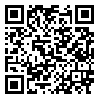
فصلنامه آینده پژوهی مدیریت منابع انسانی

دوره 2، شماره 8 - ( 6-1398 )
جلد 2 شماره 8 صفحات 71-45 |
برگشت به فهرست نسخه ها
Download citation:
BibTeX | RIS | EndNote | Medlars | ProCite | Reference Manager | RefWorks
Send citation to:



BibTeX | RIS | EndNote | Medlars | ProCite | Reference Manager | RefWorks
Send citation to:
jafariniya S. Ranking Effective Bases on Performance of Human Resource Planning Systems (Correlation and Fuzzy Approach). Journal title 2019; 2 (8) :45-71
URL: http://jde.khu.ac.ir/article-1-100-fa.html
URL: http://jde.khu.ac.ir/article-1-100-fa.html
جعفری نیا سعید، شادبخت فریبرز. رتبه بندی ارکان موثر بر عملکرد سیستمهای برنامه ریزی منابع انسانی با رویکرد فازی. عنوان نشریه. 1398; 2 (8) :45-71
دانشگاه خوارزمی
چکیده: (2247 مشاهده)
در این پژوهش به رتبه بندی ارکان موثر بر عملکرد سیستم های برنامه ریزی منابع انسانی با رویکرد فازی پرداخته شده است . جامعه آماری این پژوهش، مدیران باتجربه در زمینه منابع انسانی ستاد وزارت جهاد کشاورزی به تعداد 100 نفر می باشند که با توجه به قلت مدیران مطلع در این حوزه تعداد نمونه به تعداد جامعه انتخاب گردید. جهت جمع آوری داده های پژوهش از ابزار پرسشنامه استفاده گردید .پرسشنامه این پژوهش، شامل 24 سوال هفت گزینهای می باشد. برای تعیین میزان تاثیر هر یک از ارکان سیستم برنامه ریزی منابع انسانی و همچنین برای رتبهبندی ارکان سیستم برنامه ریزی منابع انسانی در عملکرد منابع انسانی ستاد وزارت جهاد کشاورزی از روش شباهت به گزینه ایدهآل فازی یا تاپسیس فازی (FTOPSIS) استفاده میشود. از طریق همبستگی ارتباط بین متغیرها سنجش شد بین مهارت فردی، مدلهای ذهنی، چشم انداز مشترک، یادگیری تیمی و تفکر سیستمی با بهره وری سازمانی در مدیران ستاد وزارت جهاد کشاورزی یک رابطه مثبت و معنادار وجود دارد. در این پژوهش 5 عامل مهم که شامل مهارتهای فردی، مدلهای ذهنی ، چشم انداز مشترک، یادگیری تیمی و تفکر سیستمی است بررسی شد و مشخص گردید با استفاده از نظر مدیران ستاد وزارت جهاد کشاورزی مهارتهای فردی بیشترین تاثیر و چشم انداز مشترک کمترین تاثیر را در عملکرد منابع انسانی در ستاد وزارت جهاد کشاورزی دارد.
فهرست منابع
1. Babnik et al.(2014). Individuals learning in work teams: Support to knowledge management initiatives and an important source of organizational learning. Social and Behavioral Sciences. No. 124, pp. 178 - 185. [DOI:10.1016/j.sbspro.2014.02.475]
2. Bennis, W. & et al (1985), The Planning of Change, Newyork: Holt, Rinehart and Winston.
3. Brown, J.S. & Duguid, P. (2013), Organizational Learning and Communities-of practice: Toward a unified view of working, learning, and innovation, Organization Science.
4. Carre P.& Pearn M.(2015), L'Autoformation dans L'Eeterprise,Paris:Editions Entente.
5. Daft, Richard L. (1998), Essentials of Organizational Theory and Design , Cincinnati:South-Western College Publishing.
6. Daft, R.& Lengel, R.H. (2012), Organizational Information Requirmenets, Media Riches, and Structual Design, Organization Science.
7. Dodgson,M (2011), Organizational Learning: A Review of Some Literatares. Organizatin Studies, Vol 14, No 3. [DOI:10.1177/017084069301400303]
8. Foil, c & et al (2011), Organizational Learning, Academy of Management Review, Vol 10,No 4. [DOI:10.2307/258048]
9. Friedman, T.L. (2013), The Lexus and The Olive Tree, Newyork:Anchor books.
10. Gadamer, H (1979), Truth and Method, London: Sheed and Ward.
11. Garvin, David(1993), Building a Learning Organization, Harvard Business Review, Aug.
12. Garvin, David(2000), Learning in Action, Harward Business School Press, http"//www2.darwiongmag.com.
13. Gershman, A. & Gottsman, E.(2002), Hypermedia for Corporate Knowledge Dissemination, Proceedings of the Twenty-Sixth Hawaii International Conference on System Science '93, CA;IEEE Press.
14. Grantham, C.E. & Nichols, L.D. (2010), The Digital Workplace: Designing Groupware Platforms, New york: Van Nostrand Reinhold.
15. Habermas,J (1984), The Theory of Communicative Action, volum 1, Cambridge: Policy Press.
16. Hiltz, S.R & Turoff, M. (2005), The Network Nation: Human Communication via Computer, MA: MIT Press.
17. Huber, G.P. (1991), Organizational Learning: The contributing processes and the literatures, Organization Science. [DOI:10.1287/orsc.2.1.88]
18. Isakowitz, T. (2009), Hypermedia, Information Systems, and Organizations: A research agenda, Proceedings of the Twenty-Sixth, Hawaii International Conference on System Science '93, CA; IEEE Press.
19. Jaafari et al.(2012).The relationship among organizational climate, organizational Learning and teacher's self efficacy. Social and Behavioral Sciences. No. 47. pp 2212 - 2218. [DOI:10.1016/j.sbspro.2012.06.974]
| بازنشر اطلاعات | |
 | این مقاله تحت شرایط Creative Commons Attribution-NonCommercial 4.0 International License قابل بازنشر است. |



